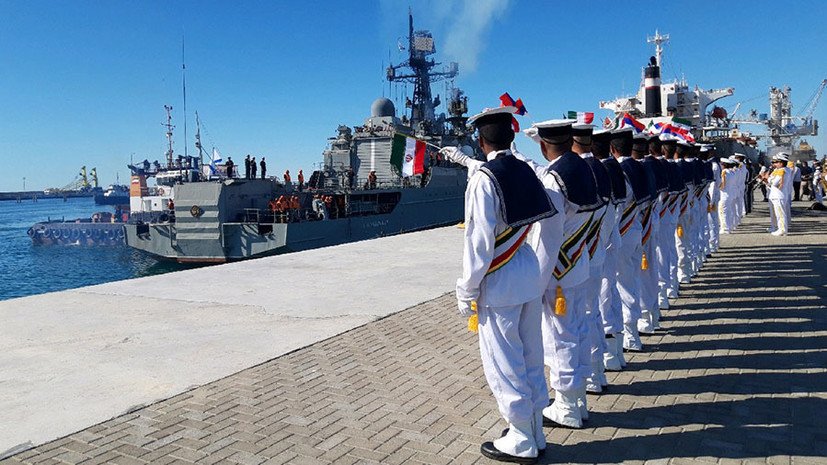Iran said the United States and its allies made an unsuccessful attempt to disrupt the naval exercises of the Islamic republic with Russia and China.
As the commander of the Iranian Navy, Rear Admiral Hossein Hunzied told Tasnim agency, during the joint maneuvers of the three countries, "the Americans and their allies held an emergency meeting aimed at disrupting" the exercises.
As Khanzady said, thanks to distracting maneuvers, the Americans were not able to disrupt the teachings.
It should be noted that the joint exercises of Iran, Russia and the PRC under the name "Marine Safety Belt" were held in the Indian Ocean and the Gulf of Oman from December 27 to 30. On maneuvers, the parties worked out measures to combat terrorism and ensure security in this zone.
“The purpose of these exercises is peace and stability in the region, the fight against terrorism and maritime piracy,” said Iranian Ambassador to Russia Kazem Jalali on the eve of the exercises.
The participation of the Russian side in the exercises was commented on in the Ministry of Foreign Affairs and the Baltic Fleet. The preparation for these maneuvers was confirmed by the head of the Russian Foreign Ministry, Sergey Lavrov, and representatives of the fleet told the details of the composition of the group from the Russian Federation.
In a statement to the Baltic Fleet press service, it was reported that the Yaroslav the Wise patrol ship, the Victor Tonetskiy tugboat, and the Yelnya tanker headed for the Iranian shores.
In turn, the official representative of the Ministry of Defense of the People's Republic of China, U Qian, spoke about the participation in the maneuvers of the Chinese side at a monthly briefing. According to him, the Xining missile destroyer is involved in the exercises.
Meanwhile, representatives of the Pentagon initially said that they intend to follow the teachings of Iran, Russia and China.
“We will observe this and continue to work with our partners and allies to ensure freedom of navigation and free trade flow on international waterways,” said Sean Robertson, representative of the US defense department.
Confrontation intensifies
A new round of conflict between Iran and the United States occurred in May, when Washington sent additional forces to the Persian Gulf.
John Bolton, US presidential adviser on national security, said on May 5 that American ships were sent to the region to send "a clear and unambiguous signal to the Iranian regime that any encroachment on the interests of the United States or its allies would be met with inexorable force."
In June, two tankers were blown up in the international waters of the Gulf of Oman - Front Altair (marched under the flag of the Marshall Islands) and Kokuka Courageous (marched under the flag of Panama). The United States blamed Iran for what happened, but Tehran did not agree with this assessment.
In the months that followed, several other incidents involving tankers and drones from the United States and Iran occurred in the Persian Gulf. Washington in several stages increased the sanctions pressure on Tehran.
In addition, in September, UAVs attacked the refineries of Saudi Aramco, a state-owned company in Saudi Arabia. Husite Yemeni rebels claimed responsibility, but the United States blamed Tehran for the attacks. Secretary of State Mike Pompeo called on all countries to "publicly and unconditionally condemn Iran’s attacks."
Iran has declared no involvement in attacks on oil facilities in Saudi Arabia. In addition, Iranian Foreign Minister Mohammad Jawad Zarif warned of the threat of a full-scale war in the event of an attack by the United States or Saudi Arabia on Iran.
In November, Iran was seized by protests related to rising fuel prices, the White House expressed support for these statements. In turn, Tehran spoke about the US involvement in these incidents and reported the detention of eight people during the protests associated with the Central Intelligence Agency (CIA) of the United States.
The Iranian law enforcement agencies then specified that six detainees were in protests and carried out the orders of intelligence agencies, two more were collecting information in order to send it abroad.
Against the backdrop of these events, Iran’s supreme leader Ali Khamenei spoke of a “foiled conspiracy”. According to the ayatollah, external forces have long been preparing the opportunity to perpetrate destruction and killings in Iran.
“The people once again proved that they are strong and great, and were able to defeat the enemy’s conspiracy,” Khamenei said in a message on his personal website.

